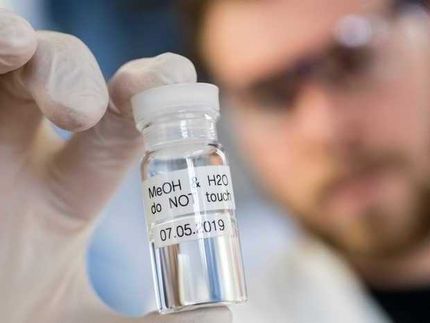First production of liquid hydrocarbons from biological feedstock using the Isobutene process
Advertisement
Global Bioenergies announces having converted renewable resources into gaseous isobutene, and secondarily into liquid fuels similar to those extracted from oil. This mix of fuels can be compared to light oil, and thus be considered as «renewable oil».
Gaseous isobutene is one of the main building blocks of the petrochemical industry. Fifteen million tons of isobutene are derived each year from oil, and converted into fuels, plastics and elastomers. Global Bioenergies develops and scales-up a synthetic biology process to produce isobutene alternatively, from sugar, cereals, and agricultural or forestry waste.
For the first time, a batch of isobutene produced and purified on ARD's Pomacle-Bazancourt site, located close to Reims in France, has been shipped in pressurized containers to the Fraunhofer Institute on the Leuna refinery platform, close to Leipzig in Germany.
This batch has been run through an industrially relevant catalytic unit resulting in stringing isobutene molecules one to the other. A mix has been produced containing isooctane (string of two isobutene molecules), isododecane (string of three), isocetane (string of four), as well as longer strings. These compounds are associated with large markets:
- Isooctane is the gold standard for gasoline engines, and corresponds to « unleaded 100 » when used pure.
- Isododecane is one of the very few bio-sourced molecules well suited to be blended in jet fuel; its registration as « bio-jet fuel » is underway in the United States of America.
- Isocetane is a heavier fuel that can be used as an additive for diesel engines.
- Longer molecular chains are used in the manufacturing of industrial lubricants.
Rick Bockrath, Vice President for chemical engineering at Global Bioenergies, states: "Industrial fermentation of a gas such as isobutene has numerous advantages, which will translate into a reduced OPEX. We have now successfully aligned our Isobutene process with a technology leading to a liquid hydrocarbon mix resembling to light oil. Our target will now be to purify the different components of this mix. Getting high-purity isooctane is one of the main goals of our alliance with Audi."
Most read news
Organizations
Other news from the department manufacturing

Get the chemical industry in your inbox
By submitting this form you agree that LUMITOS AG will send you the newsletter(s) selected above by email. Your data will not be passed on to third parties. Your data will be stored and processed in accordance with our data protection regulations. LUMITOS may contact you by email for the purpose of advertising or market and opinion surveys. You can revoke your consent at any time without giving reasons to LUMITOS AG, Ernst-Augustin-Str. 2, 12489 Berlin, Germany or by e-mail at revoke@lumitos.com with effect for the future. In addition, each email contains a link to unsubscribe from the corresponding newsletter.






























































